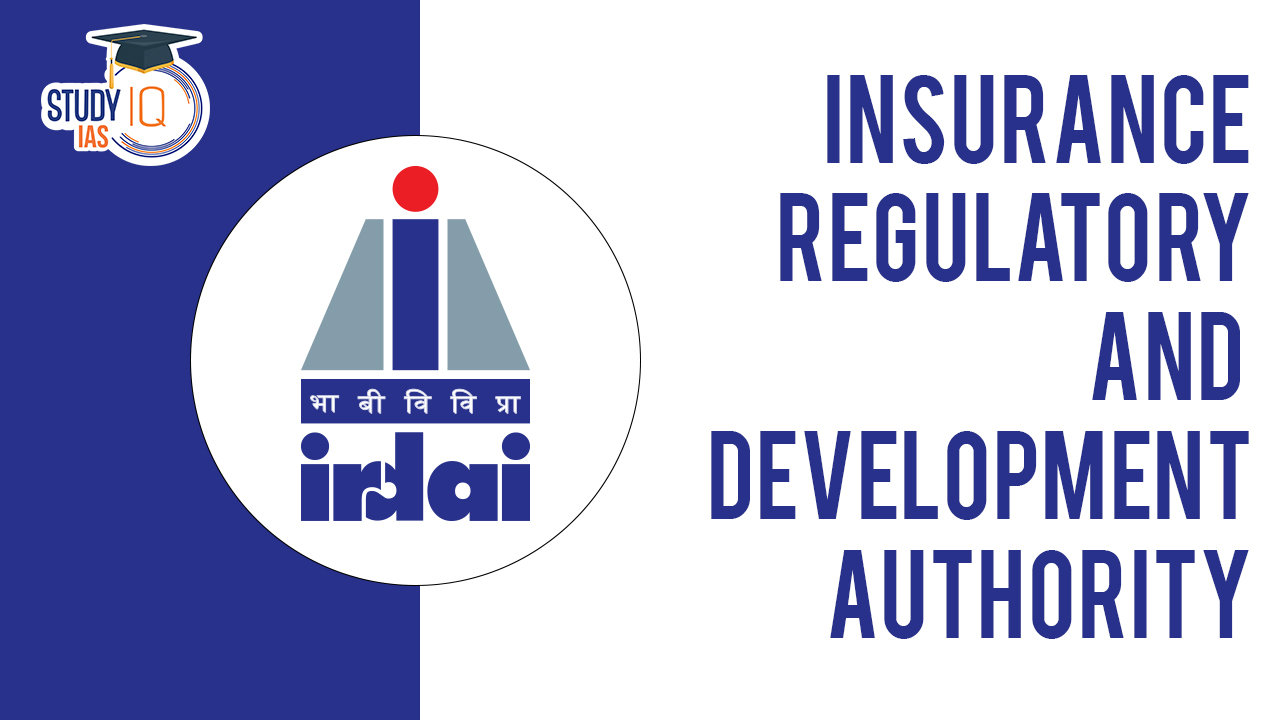Table of Contents
Insurance Regulatory and Development Authority
The Insurance Regulatory and Development Authority of India (IRDAI or IRDA) was established in India in 2000 under the Insurance Regulatory and Development Authority Act, of 1999. It was formed based on the recommendations of the Malhotra Committee, which advocated for reforms in the insurance sector.
The IRDAI serves as an autonomous regulatory body under the Ministry of Finance and aims to regulate and promote the insurance industry, protect policyholders’ interests, and ensure the orderly growth of the sector. It has played a significant role in facilitating the entry of private players, introducing transparency and fair practices, and fostering competition and innovation in the Indian insurance market.
Read about: Insurance Sector in India
Insurance Regulatory and Development Authority Objectives
The Insurance Regulatory and Development Authority (IRDA) in India has the following primary objectives:
- Regulation: To regulate and supervise the insurance industry, ensuring compliance with applicable laws, rules, and regulations.
- Policyholder Protection: To protect the interests of policyholders and ensure fair treatment by insurance companies.
- Market Development: To promote the development and growth of the insurance market, fostering competition, innovation, and efficiency.
- Financial Stability: To ensure the financial stability and solvency of insurance companies through prudent regulations and oversight.
- Consumer Awareness: To enhance public awareness and knowledge about insurance, encouraging informed decision-making.
- Intermediary Supervision: To regulate insurance intermediaries, such as brokers and agents, ensuring their professionalism, integrity, and fair practices.
- Insurance Product Regulation: To regulate insurance products, terms, and conditions, promoting transparency and suitability for policyholders.
- Grievance Redressal: To establish effective mechanisms for the timely and fair resolution of policyholders’ complaints and grievances.
Functions of IRDA
As per the Insurance Regulatory and Development Authority (IRDA) Act, 1999, the functions of IRDA are defined in Section 14 of the Act. The relevant functions include:
- Granting Licenses (Section 14(2)(a)): The IRDA is responsible for granting licenses to insurance companies, agents, brokers, surveyors, and other entities involved in the insurance business, subject to meeting the prescribed criteria.
- Regulating Insurance Products (Section 14(2)(b)): The IRDA regulates and specifies the terms and conditions of insurance policies, ensuring that they are in the best interests of policyholders.
- Protecting Policyholders’ Interests (Section 14(2)(c)): The IRDA ensures the protection of policyholders’ interests and the proper implementation of insurance policies.
- Specifying the Code of Conduct (Section 14(2)(d)): The IRDA specifies the code of conduct for insurance intermediaries, such as agents and brokers, to ensure their ethical practices and fair dealing with policyholders.
- Promoting Efficiency and Transparency (Section 14(2)(e)): The IRDA promotes efficiency, transparency, and orderly conduct in the insurance industry by establishing regulations, guidelines, and standards.
- Regulating Investment of Funds (Section 14(2)(f)): The IRDA regulates the investment of funds by insurance companies, ensuring prudence and protecting the interests of policyholders.
- Monitoring Solvency Margin (Section 14(2)(g)): The IRDA monitors the solvency margin of insurance companies, ensuring that they maintain sufficient financial resources to meet their obligations towards policyholders.
- Adjudicating Disputes (Section 14(2)(h)): The IRDA has the authority to adjudicate disputes between insurance companies and intermediaries and between insurance companies and policyholders.
- Promoting Market Development (Section 14(2)(i)): The IRDA promotes and facilitates the development of a robust and competitive insurance market in India.
Read about: Planning Commission
Insurance Regulatory and Development Authority Act 1999
The Insurance Regulatory and Development Authority (IRDA) Act, 1999 is a comprehensive legislation that governs the establishment, powers, functions, and regulations related to the IRDA and the insurance industry in India. The Act consists of multiple provisions covering various aspects of insurance regulation. While listing all the provisions in their entirety would be impractical, here are some of the key provisions of the IRDA Act, 1999:
- Establishment of IRDA (Section 3): The Act establishes the IRDA as an autonomous regulatory body responsible for the regulation and development of the insurance industry in India.
- Composition of IRDA (Section 4): The Act specifies the composition of the IRDA, including the appointment of a Chairperson, members, and their qualifications.
- Powers and Functions of IRDA (Section 14): This section outlines the functions and powers of the IRDA, including granting licenses, regulating insurance products, protecting policyholders’ interests, specifying codes of conduct, promoting efficiency and transparency, monitoring solvency margins, and adjudicating disputes.
- Registration of Insurers (Section 3A): The Act outlines the process and criteria for the registration and licensing of insurance companies.
- Powers of IRDA to Issue Regulations (Section 25): The IRDA is empowered to issue regulations for carrying out the provisions of the Act, including regulations related to licensing, registration, solvency margins, investments, and other aspects of insurance business.
- Powers of IRDA to Levy Penalties (Section 102): The IRDA has the authority to impose penalties for contraventions of the Act or regulations issued under it.
- Appeals (Section 110): The Act provides for the establishment of an Insurance Appellate Tribunal to hear and dispose of appeals against the decisions of the IRDA.
- Offences and Penalties (Sections 102-113): The Act stipulates various offences and penalties related to insurance fraud, non-compliance with regulations, and other violations.
- Cooperation with Other Authorities (Section 14B): The IRDA is empowered to cooperate with other authorities, including regulatory bodies in other countries, for the effective regulation and development of the insurance sector.
These provisions, among others, form the legal framework for the functioning of the IRDA and the regulation of the insurance industry in India.
Read about: Important Schemes of Indian Government
Insurance Regulatory and Development Authority Chairman
The Chairman of the Insurance Regulatory and Development Authority (IRDA) in India is appointed by the Central Government of India. The process of appointment involves the following steps:
- Selection Committee: A Selection Committee is constituted by the Central Government to recommend suitable candidates for the position of Chairman. The committee typically consists of senior government officials and experts from the insurance industry.
- Eligibility Criteria: The Selection Committee considers various factors such as qualifications, experience, and expertise in the insurance sector while shortlisting candidates for the position of Chairman.
- Recommendation: The Selection Committee recommends a candidate to the Central Government for the appointment as Chairman of the IRDA.
- Appointment: Based on the recommendation of the Selection Committee, the Central Government appoints the Chairman of the IRDA.
The term of the Chairman of IRDA is determined by the Central Government at the time of appointment. As per the IRDA Act, of 1999, there is no fixed term specified for the Chairman. However, it is common for the Chairman to serve a fixed term of five years or as decided by the Central Government. The Chairman may be eligible for reappointment based on the discretion of the government.
The current Chairman of the Insurance Regulatory and Development Authority of India (IRDAI) is Debasish Panda, who was appointed for a term of three years. He is an officer of the 1987 batch of the Indian Administrative Service from the Uttar Pradesh cadre, and assumed the position following a vacancy that lasted over nine months since the departure of Subhash Chandra Khuntia in May 2021. Prior to joining the IRDAI, Panda held the position of Secretary in the Department of Financial Services under the Ministry of Finance, Government of India.
Read about: Five Year Plans of India
Insurance Regulatory and Development Authority UPSC
The topic of the Insurance Regulatory and Development Authority (IRDA) is important for the UPSC exam as it covers governance, economics, and finance, which are part of the UPSC Syllabus. Understanding the functions of the IRDA is crucial for candidates, and they can benefit from UPSC Online Coaching and UPSC Mock Test to enhance their preparation.
Read about: Securities and Exchange Board of India


 Repo Rate and Reverse Repo Rate, Impact ...
Repo Rate and Reverse Repo Rate, Impact ...
 Foreign Contribution Regulation Act (FCR...
Foreign Contribution Regulation Act (FCR...
 Urban Cooperative Banks in India, Functi...
Urban Cooperative Banks in India, Functi...





















